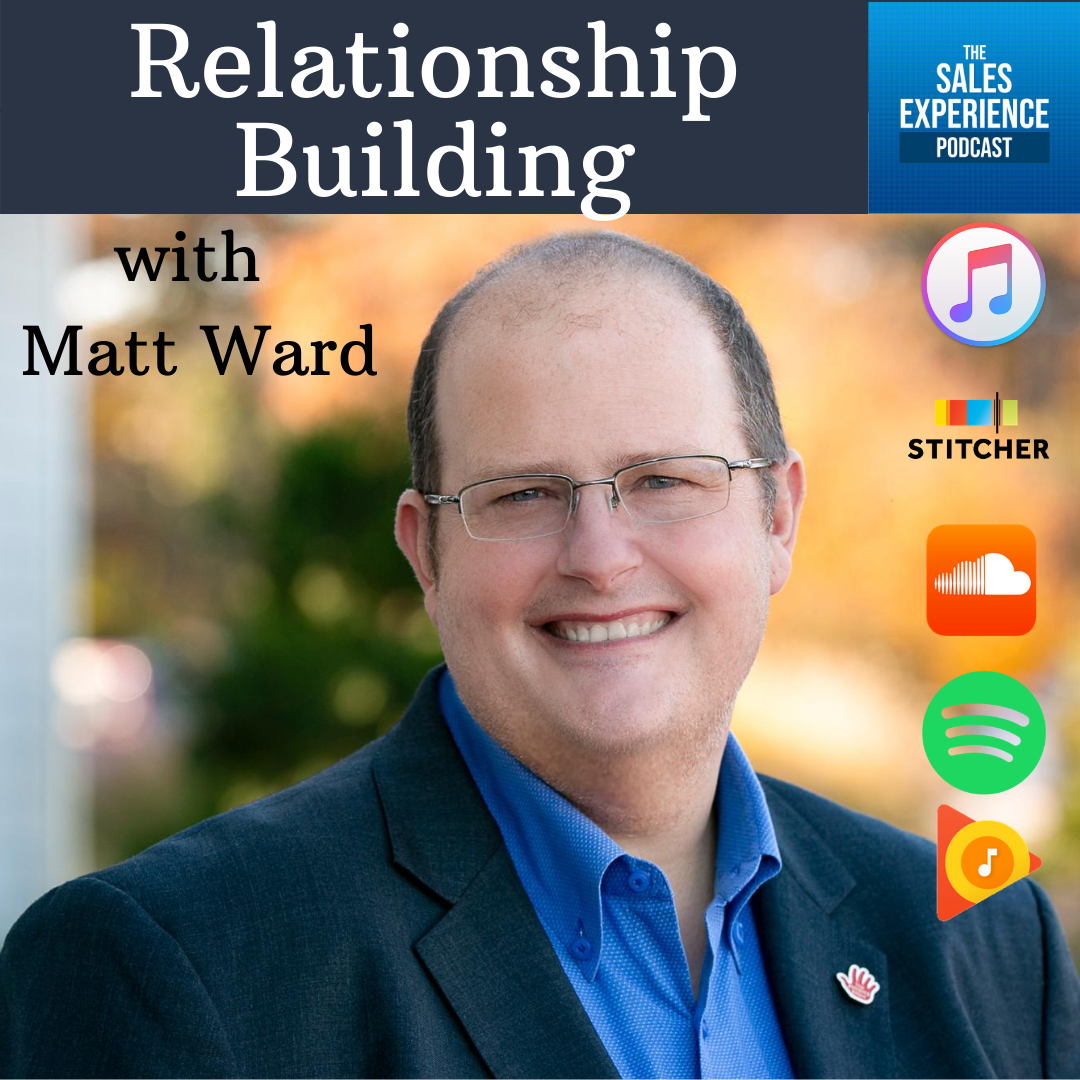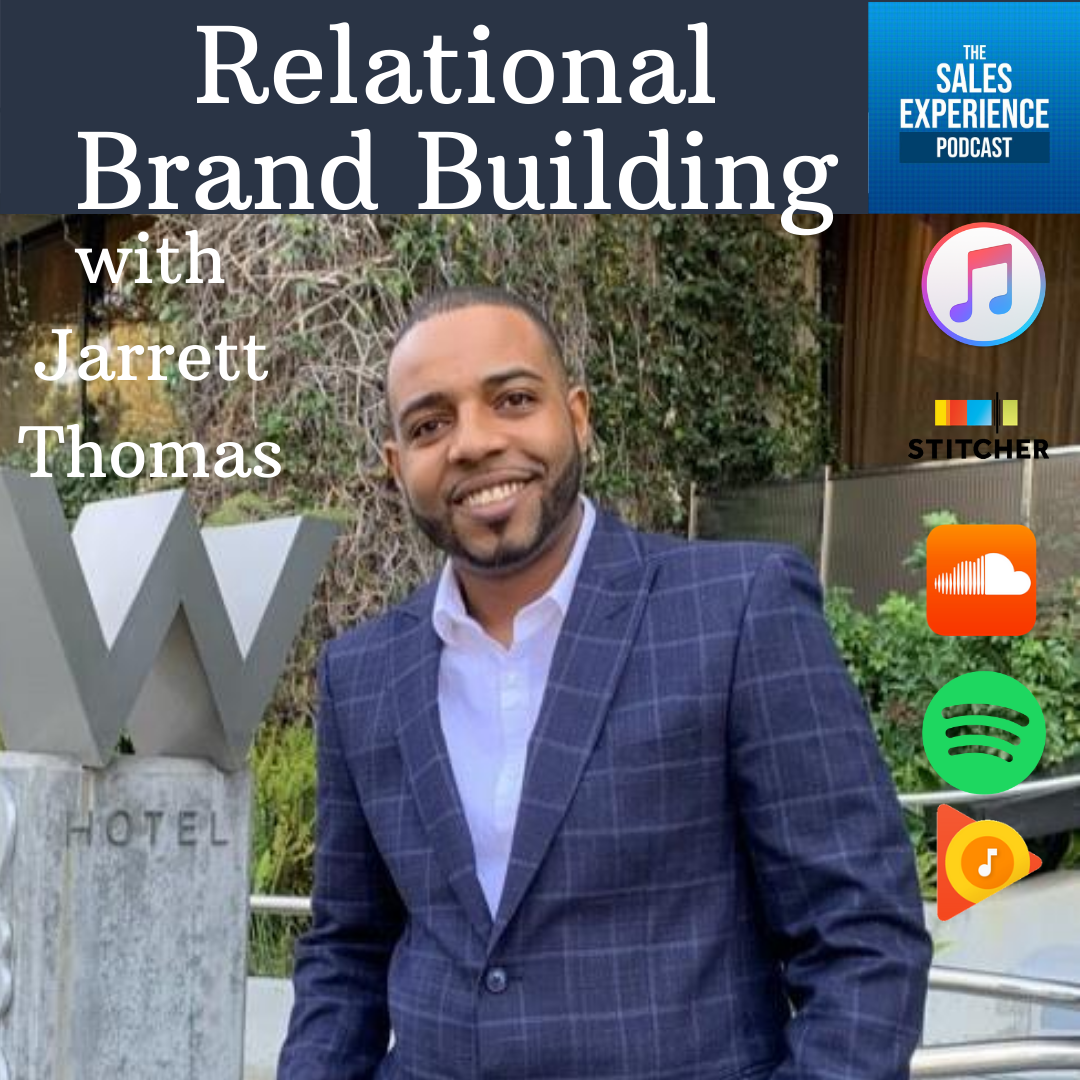Episode Transcript
Jason: A lot of times salespeople get excited. They don't want to point out the negatives. They are not confident in maybe themselves or their sales process. They're worried about pointing out those things that somebody else might view as a trade off. When in fact, what you want to do as a salesperson is make sure it's a good fit.
Point out the positives, but then also bring to light any trade offs or anything that the customer might experience that could be negative, but they understand it's part of the process. Welcome to the sales experience podcast, the show for salespeople and sales leaders, where we help you create the ideal sales experience to generate raving fan customers.
Grab your notepad and get ready for actionable steps. You can use to change sales from a dirty word to an active service for your prospects. Now for your host, Jason Cotter.
I am so glad that you're here. I'm so glad that you're taking the time to hopefully up a level your sales career or your sales team by listening to podcasts like this. Hopefully you've subscribed. If not, make sure to subscribe. And if you like this, leave a rating and a review. And in this episode, I am going to address some.
Sales related questions to try to help everybody in sales, do more, be more and sell more with their career and achieve their goals. Now let's go ahead and jump into this episode. Hey, what's going on in today's topic. I want to answer a question from Wendy bat, and this is regarding the authentic persuasion Q and a sessions that I've been doing.
So what Wendy sent me was. A challenge would be continuing to believe in your product when it fails. There's actually a second question, but let's address this one first. So what do you do when your product fails? So when customers are buying it, when you sell it to somebody and it doesn't live up to what happened or what the expectation was set, what should have happened?
This could be a couple of different reasons and so it's important to understand which is the case. Is it that what you sold isn't a good product or service and such that like it needs to be tweaked, it needs to be changed, it needs to be improved, or it shouldn't exist? And if that's the case and it's not going to improve, My suggestion would be to move on and go sell something else that you can believe in and stand by and trust that it's going to happen and work like it's supposed to or provide the value to the customer like you're telling them that it will.
So that would be the first thing. The other part is that sometimes what happens is sales people get excited and they sell something to somebody. Move a prospect forward into being a customer when it's not a good fit or they over exaggerate or they only focus on the positives without pointing out any of the downsides or negatives.
And I have this debate with people all the time, especially founders who think they've created something that solves all the world's. Problems and is perfect in every single way. Like a parent who thinks their child is the perfect child and can do no wrong with every product or service for the positives that it has, there's always a negative or some kind of trade off or some kind of consequence, right?
So let's say a car, it might be great at this, but it's not great at that, right? Could be comfortable and safe for the family, but it might not be fast, right? It might be fast, but it might not be comfortable for more than two people or for driving long. There's so many things that a product could have as their positive and their negative or what somebody might perceive as a negative trade off for that item.
It's just the case, right? Like they say, good, fast, or cheap, two out of the three, but never all three. Even if you're buying paper towels, you can't have amazing paper towels that are also cheap and effective. It usually doesn't work that way. So there's some kind of trade off. And a lot of times salespeople get excited.
They don't want to point out the negatives. They're not confident in maybe themselves or their sales process. They're worried about pointing out those things that somebody else might view as a trade off. When in fact, what you want to do as a salesperson is make sure it's a good fit, point out the positives, but then also bring to light any trade offs or anything that the customer might experience that could be negative or they might not like, but they understand it's part of the process.
And so it's key to do that because if you don't do that, What happens is somebody becomes a customer and then they get upset because the expectation was set that this is a purple unicorn that will solve all of their problems. That's the perfect fit and does everything that needs to be done with no downsides.
It's the wonder drug and then life doesn't work that way. There's always something. There's always some kind of trade off with everything. And so it's important as a salesperson to always point that out because what I see. As salespeople sometimes thinking that their product or service doesn't work or that it failed or that it's not effective, a lot of times is the expectation being set up front that's not possible when the customer becomes a customer and starts using that product or service.
So that's the first, if it's obviously failing, if it's not a good fit, then either hopefully the company will fix it or you can go sell something else. And then also always make sure you're setting the right expectation, not the positive. Not the great expectation, but the real expectation of the positives and the potential negatives of your product or service.
So that's the first answer to the first question. Second question that Wendy sent to me was competing against low cost providers when the majority of customers have been facing budget cuts. Obviously right now we're dealing with this global pandemic. We're dealing with economic crisis. Everyday reports are coming out about different countries in different areas going into a recession officially and what's been happening the last few months.
And so here's the thing is when you're competing against low cost providers, you're never going to win because it's going to be a race to the bottom. If you're selling something of value that actually will help your prospects in some way, help them gain or achieve a goal or help them avoid pain or loss.
If you're helping them in some way, it should not be about the lowest cost option, but the best fit and the best value. Now, Obviously, if people are facing budget cuts or financial challenges, you want to be respectful of that and you want to make sure it's still a good fit, but you've got to be careful not to give away the farm and cut prices or cut anything like that because what you're doing again, racing to the bottom and you're giving up the price, which is going to undercut the value.
If you have something that's valuable. People will find a way to pay for it. They'll find a way in their budget to do it.
Jason: And it's really going to come down to you and your ability to persuade them for the value of what you're selling relative to their needs and their wants and helping them understand that cheaper is not always better.
At some level you get what you pay for, and that's what you want to make. Sure that your prospects understand and you also have to be fully okay with the fact that you're not gonna win them all you're not gonna get every single deal if people are sensitive on price, because even if you make the sale today, they're gonna think about it and linger and doubt and have buyers remorse that they overpaid that they shouldn't have done it.
And then that's going to be a tough client to maintain or a customer who may want to return whatever it is that you sold them. So hopefully that helps. Wendy, thanks for this. And if you have a question or anything you want to submit to me, you can do it through LinkedIn. You can also go to jasoncutter.com. And use any of the buttons on there to get in touch with me, set up a free sales power call, as well as find other resources, anything that I can do to help you with your sales career. Hey, it's Jason here. We'll be right back to the podcast. But first, are you ready to change the way you view your selling role and become a sales professional?
Do you have a team that is hungry for new ways to improve and grow? If so, I have various coaching and consulting programs available that might be great tools to help you achieve your goals. To learn more about the ways we can work together and to book your free sales power call, go to jasoncutter.com.
Now let's get back to the episode. Today's topic comes from Catherine Adruja and what she asked was, how do you come off as if you aren't selling to them? And then she put golden ticket. So how does it feel like you're not selling to them and they want to buy? And maybe I don't know exactly what she meant by the golden tick part, but I take that to mean like they have found the golden ticket, they want it more than you're having to sell and persuade and twist arms and convince the key is that I have found is that the more you can do the initial parts of the process.
Which some people would call discovery. I also would call it rapport and empathy, asking questions and building that trust. The more you can take that consultative approach where your number one goal is to build some kind of relationship with them relative to what you're selling and how much is necessary and applicable in that conversation.
And then also being able to know at the deepest level they will share and that you can. Pull from them through your questions, why they need your product or service. That is the key. Why do they need what you're offering, what you're selling, and why for their reasons, is it important for them? The more you can do that, the less it will feel like selling.
And the more it will feel like consulting and then persuading them to understand that what you have to offer, if it's a good fit is what they're looking for. That is the solution. Again, they have problem X, you have solution X. This should be a no brainer. They should want it. The key is though, is you've got to make sure they know why they want or need it.
And you've got to understand that you're always in a battle against your prospects, part of their brain, trying to keep them safe in their comfort zone, seeing change as the enemy and something that could cause harm and or death. That's literally what that part of their brain is saying, what all of our parts of our brain are saying when it comes to change.
Some people tolerate it more, some people tolerate it a lot less. And so your prospect is coming up against that in their mind, and your goal is to make them feel safe that what you have to offer will get them to where they want to be. When that happens, then it's them asking you to buy. If you're having to ask them if they want to buy.
Or you're having to trick them or use a lot of slick closing lines in order to trap them in that corner. Then that means you have a battle now and in the future in retaining that customer versus getting the buy. When I hear golden ticket I think of Willy Wonka and the Charlie and the Chocolate Factory.
And what was that? Nobody had to convince anybody in that movie or in those books that they wanted the golden ticket, that they wanted a chance to get into the chocolate factory. Everyone wanted it because they wanted it for their reasons. And they went nuts. That's the key. So you want to make sure your prospects understand for their reasons why they want it.
If you are in a sales role, it's your job as a professional to help. Guide them there and uncover that unpack it and then present it to them such that it's a no brainer from their side that they want to buy from you and then they will be happy. Then they will become a raving fan. They may even send you lots of referrals because they bought for their reasons, not your reasons.
So hopefully that helps. Thank you again, Catherine, for the question, the submission. If you have a question, anything you want to submit to me, send it via LinkedIn. You can also go to Jason cutter. com where you can find lots of other resources. You can book a free sales power call with me, get on the phone.
We can talk about sales and there's lots of different ways I might be able to help you achieve greater success in your sales career. That's it for today. I'll see you tomorrow.
![[E230] When your customers complain + sell without selling (Q&A)](https://episodes.castos.com/salesexperiencepodcast/images/TSEP-Cover-APQA-1.png)


